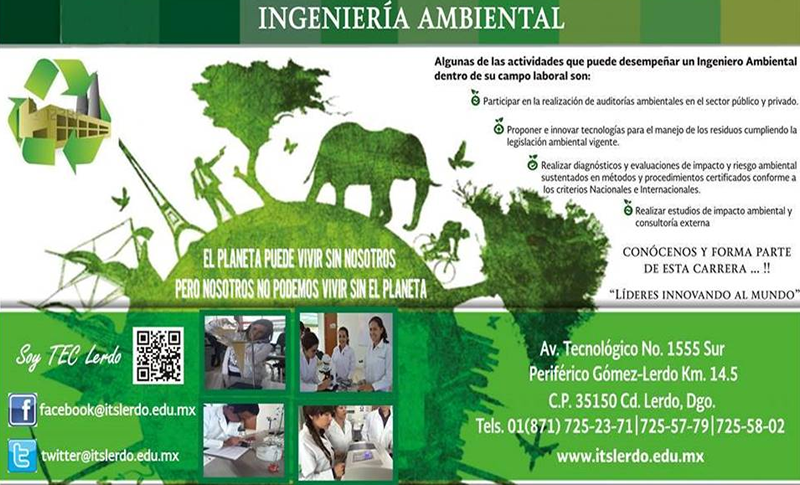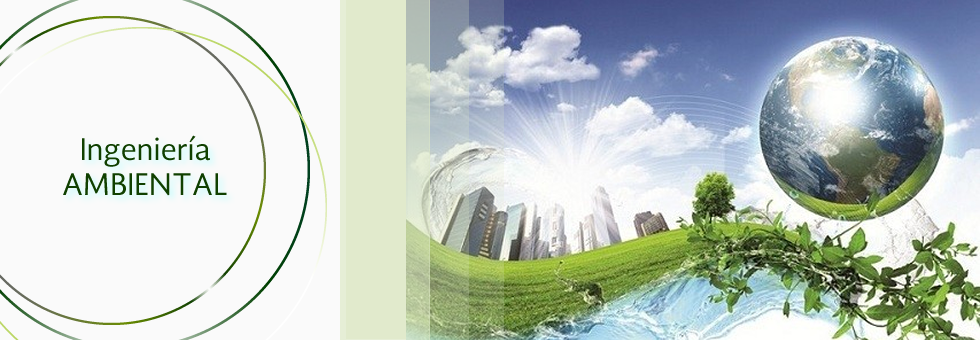Environmental Engineering
Specialty
Waste Minimization and Management
General Objective
To train ethical, analytical, critical and creative professionals in Environmental Engineering with the skills to identify and propose, in a multidisciplinary way, solutions to environmental problems; ensuring protection, conservation and improvement of the environment, under a legal framework, seeking sustainable development for the benefit of life on the planet.
Educational Objectives
- Graduates will have the ability to develop, implement and maintain environmental management systems.
- Graduates will work in water treatment processes..
- Graduates will have the ability to formulate and lead projects.
- Graduates will have the ability to manage waste.
Graduate Attributes
- To identify, formulate and solve Environmental Engineering problems applying the principles of engineering, science and mathematics.
- To apply, analyze, and synthesize environmental engineering design processes that result in projects that meet specified needs.
- To develop and conduct adequate experimentation; analyze and interpret data and use engineering judgment to establish conclusions based on current regulations.
- To communicate effectively with different audiences.
- To recognize their ethical and professional responsibilities in relevant situations to engineering, and make informed judgments that must consider the impact of engineering solutions in global, economic, environmental and social contexts.
- To recognize the permanent need for professional updating, and have the ability to locate, evaluate, integrate and apply this knowledge appropriately based on current regulations.
- To work effectively in teams that set goals, plan tasks, meet deadlines, and analyze risks and uncertainties.
Admission Profile
Applicants to enter the Environmental Engineering Degree must have:- Interest in the proper management of natural resources and the technical resolution of problems related to the prevention, control of pollution, and the promotion of sustainable development.
- Skills in handling mathematical and chemical concepts.
- Vocation of service and interest in social welfare.
- Ease of using computer tools.
- Easily adapt to teamwork.
Graduate Profile
The Environmental Engineering graduate will have the specific skills to:- Link the value of natural resources to promote their sustainable use according to the needs of the region, through instruments of awareness, sensitization and communication.
- Participate in the development and execution of the basic or applied research protocol for the resolution of environmental problems.
- Prepare, implement and maintain environmental management systems.
- Participate in conducting environmental audits in the public and private sectors.
- Carry out diagnoses and evaluations of impact and environmental risk based on certified methods and procedures according to national and international criteria.
- Prepare economic and technical feasibility studies of the processes for environmental prevention and control.
- Propose and innovate technologies for waste management in compliance with current environmental legislation.
- Know and apply basic and applied engineering criteria, as well as biological sciences for the dimensioning, adaptation, operation, maintenance and development of technologies for the treatment, prevention, control and transformation of contaminated solid, liquid and gaseous effluents.
- Know and apply ICT, as well as computer systems or specialized software in the environmental area.
- Be analytical, ethical, critical, and aware of the importance of their environment for life, and respectful of it, being a promoter of sustainable development.
- Be able to train human resources, carry out teaching, research and training activities.
- Have an entrepreneurial and leadership attitude to interact with multidisciplinary and interdisciplinary groups in the search for solutions to the problems of environmental deterioration.











